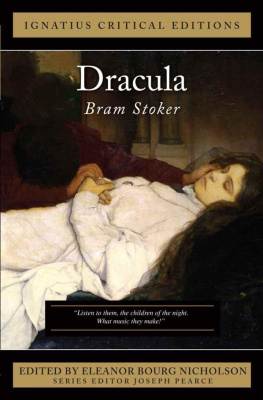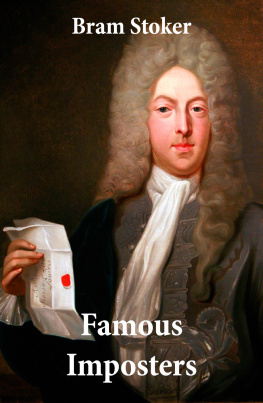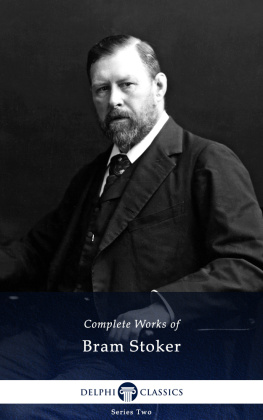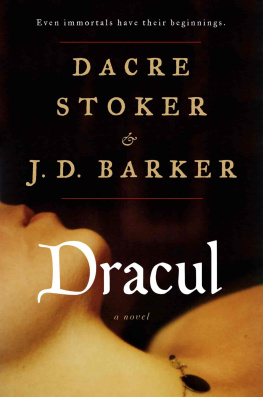Bram Stoker - The Censorship of Fiction
Here you can read online Bram Stoker - The Censorship of Fiction full text of the book (entire story) in english for free. Download pdf and epub, get meaning, cover and reviews about this ebook. City: New York, year: 1908, publisher: Leonard Scott Publication Co., genre: Science. Description of the work, (preface) as well as reviews are available. Best literature library LitArk.com created for fans of good reading and offers a wide selection of genres:
Romance novel
Science fiction
Adventure
Detective
Science
History
Home and family
Prose
Art
Politics
Computer
Non-fiction
Religion
Business
Children
Humor
Choose a favorite category and find really read worthwhile books. Enjoy immersion in the world of imagination, feel the emotions of the characters or learn something new for yourself, make an fascinating discovery.

- Book:The Censorship of Fiction
- Author:
- Publisher:Leonard Scott Publication Co.
- Genre:
- Year:1908
- City:New York
- Rating:5 / 5
- Favourites:Add to favourites
- Your mark:
- 100
- 1
- 2
- 3
- 4
- 5
The Censorship of Fiction: summary, description and annotation
We offer to read an annotation, description, summary or preface (depends on what the author of the book "The Censorship of Fiction" wrote himself). If you haven't found the necessary information about the book — write in the comments, we will try to find it.
The Censorship of Fiction — read online for free the complete book (whole text) full work
Below is the text of the book, divided by pages. System saving the place of the last page read, allows you to conveniently read the book "The Censorship of Fiction" online for free, without having to search again every time where you left off. Put a bookmark, and you can go to the page where you finished reading at any time.
Font size:
Interval:
Bookmark:
THE CENSORSHIP OF FICTION
There is perhaps no branch of work amongst the arts so free at the present time as that of the writing of fiction. There are no official prohibitions, no embarrassing or hampering limitations, no oppressive restraints. Subject and method of treatment are both free. A writer is under no special obligation, no preliminary guarantee; he may choose his own subject and treat it in his own way. In fact, his duty to the publicto the Stateappears to be nil. What one might call the cosmic police do not trouble him at all. Under these conditions, hitherto kept possible by the self-respect of authors, a branch of the art of authorship has arisen and gone on perfecting itself in mechanical excellence, until it has become an important factor of the life of the nation. Today if the supply of fiction were to be suddenly withdrawn the effect would be felt almost as much as the failure of the supply of breadstuffs. Happily fiction is not dependent on the existence of peace, or the flourishing of trade, or indeed on any form of national well-being. War and business worriesdistress in any formare clamorous in their own ways for intellectual antidotes; so that though the nature of the output may be of every varying kind, the supply is undiminished. Herein it is that the wide scope of the art of fiction proves its excellence; as no subject and no form of treatment is barred it follows that changing needs may find settlement in suitable opposites. And so imaginative work becomes recognised in the higher statecraft as a useful product.
But in the real world all things are finally relative. There is in reality, whose existence and progress must be based on cosmic laws, no such thing as absolute freedom. The needs and necessarily recognised rights of individuals and groups must at times become so conflicting that some sort of give-and-take rules or laws are necessary to the general good. Indeed we might put it in general form that freedom contains in its very structure the germs of restraint. The measure and method of that restraint have to be ascertained by experience, and in some measure by experiment, for if we wait till experience, following a simple course of laissez faire, has learned the worst that can happen, at least a part of the protective force of common sense is thrown away.
This is a philosophy too simple to be put in books, and has its existence in the brain of every sane individual. Let us apply it to the subject in questionthe union or at least the recognition of two values, the excellences of imagination and of restraint. Restraint may be one of two kindseither that which is compelled by external forces, or that which comes from within. In art the latter in its usual phase is known as reticence. This is the highest quality of art; that which can be and is its chief and crowning glory. It is an attribute practically undefinable. Its conditions are so varying and so multitudinous, its degrees so finely graded, its workings so mysterious, its end so elusive, that it is not possible to explain it adequately by words which are themselves defective and yet of ever-varying meaning. Suffice it that it is recognisable, and recognised, by all true artists. In it consists largely, if not wholly, the ethics of art; and on it, or in it depends that quality of art which brings it within the classification of high art. The measure of the ethics of the artist is expressed in the reticence shown in his work; and where such self-restraint exists there is no need for external compelling force. In fact, self-restraint is the bulwark of freedom, inasmuch as it makes other forms of restraint unnecessary. Some power must somewhere in the advance of things recognise the imperfection of humanity. When the integer of that great body recognises that imperfection and the evils consequent upon it, those evils are at their least.
This is especially so where imagination is concerned, for the bounds of such being vague, the restraint from within need only be applied to the hither or known edge of the area of demarcation; whereas if laws of restraint have to be made at all they must, in order to be of efficacy, be applicable to the whole area. This proposition may seem at first glance to be in some way a paradox; that as the object of the external power is to prevent a thing of possible good from straying into the region of evil, the mandate should be to prevent excursion beyond the outmost point of good. But it is no paradox at all. The object is not merely to prevent the straying from the region of good, but to do so with the least measure of effort and at the smallest cost of friction. Whatever law, then, can be made or whatever application of force used to effect thiswhether such law or force originate from within or from withoutshould in the first be as little drastic as possible and in the other as gentle as may prevail. Indeed, the difference between the internal and external forces thus applied is something like the difference between ethical and criminal laws. In the great world of fact, if ethical law be not observed the criminal law must come into operation, so that the balance of individual right be maintained and cosmic law vindicated.
I think this may be proved by the history of two great branches of fictionthe novel and the drama. By drama we must take drama when acted. Unacted drama is but the novel in another literary form. The novel we must accept in its old meaning as a story, quite irrespective of length or divisions. In the case of drama the necessity for an external controlling force has been illustrated throughout some three centuries, and by its history we may by a parity of reasoning gain some light upon the dangers of the other form of literary effort. Of course, primarily the controlling force comes into operation because the possibilities of trouble are multiplied by the fact that its mechanism of exploiting thoughts is by means of the human body; and inasmuch as poor humanity is likely to err in many ways, possibilities of error in this respect are superadded to the inherent possibilities of purely literary form. There is also another aspect of this control which must be mentioned before being set aside, lest it confuse issues in the case of the novel. This latter is the State aspect of censorship. It must be borne in mind that this is a State and not a political aspect. It came into existence and remains entirely for the protection of the King. The official who has to deal with the question is a State and not a political official, and has his bounds of jurisdiction regarding the drama fixed ipso facto by the residence of the King. But in the matter of the general welfare of the public the censorship of the drama is based on the necessity of perpetually combating human weakness. This weakness is of two kindsor rather in two forms: the weakness of the great mass of people who form audiences, and of those who are content to do base things in the way of catering for these base appetites. In fact, the quarrel rages round the standard of the higher law, made for the elevation as against the degradation of humanity; another instance of the war between God and devil. The vice of the many of the audience in this case is in the yielding to the pleasant sins or weaknesses of the flesh as against the restraining laws made for the protection of higher effort. The vice of the few who cater is avarice pure and simple. For gain of some form they are willing to break lawscall them conventions if you will, but they are none the less laws. The process of this mutual ill-doing is not usually violent. It creeps in by degrees, each one who takes a part in it going a step beyond his fellows, as though the violation of law had become an established right by its exercise. This goes on till a comparison between what was and what is shows to any eye, even an unskilled one, a startling fact of decadence. Then, as is too often observable in public matters, official guardianship of ethical values wakes up and actswhen it is too late for any practical effect. To prevent this, censorship must be continuous and rigid. There must be no beginnings of evil, no flaws in the mason work of the dam. The force of evil, anti-ethical evil, is the more dangerous as it is a natural force. It is as natural for man to sin as to live and to take a part in the necessary strife of living. But if progress be a good and is to be aimed at in the organisation of national forces, the powers of evil, natural as well as arbitrary, must be combated all along the line. It is not sufficient to make a stand, however great, here and there; the whole frontier must be protected.
Font size:
Interval:
Bookmark:
Similar books «The Censorship of Fiction»
Look at similar books to The Censorship of Fiction. We have selected literature similar in name and meaning in the hope of providing readers with more options to find new, interesting, not yet read works.
Discussion, reviews of the book The Censorship of Fiction and just readers' own opinions. Leave your comments, write what you think about the work, its meaning or the main characters. Specify what exactly you liked and what you didn't like, and why you think so.









